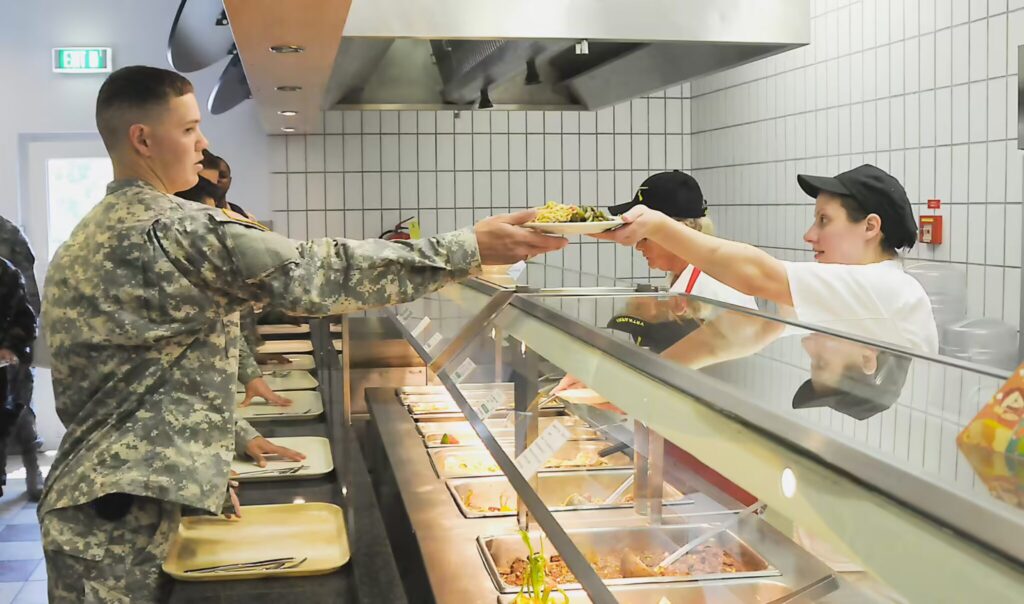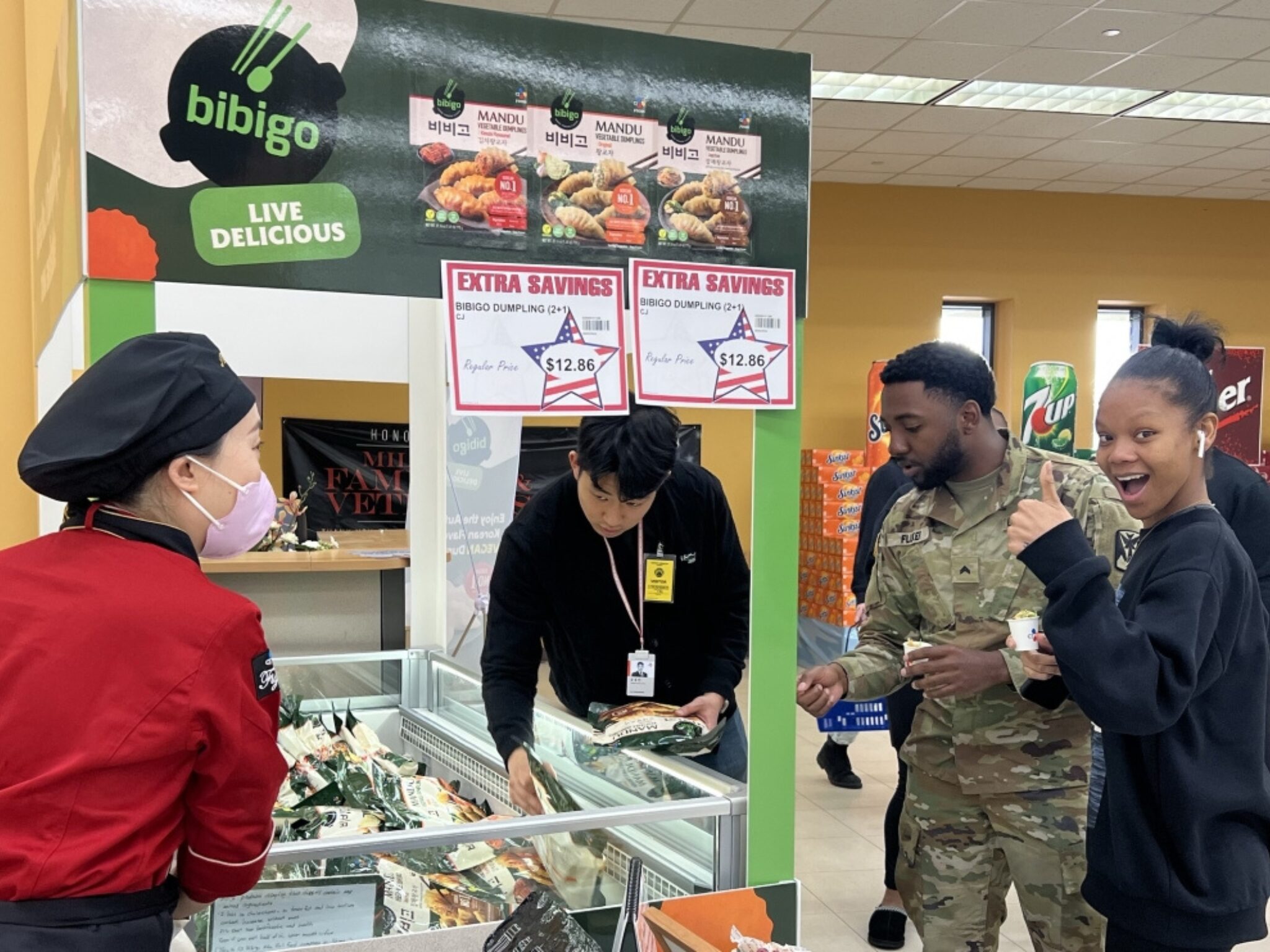5 Mins Read
Korean food giant CJ CheilJedang has introduced its plant-based dumplings to grocery stores inside US military bases in South Korea, with plans to extend the range and expand in other countries too.
Plant-based options for US military personnel are growing, with CJ CheilJedang now offering its vegan Bibigo dumplings at grocery stores in four United States Forces Korea (USFK) bases in South Korea.
On Sunday, the company launched its Giant Dumpling product range under the Bibigo brand in original, japchae and kimchi flavours, following a three-day tasting event at the USFK. While the military declined to comment on the exact bases that stock the products, it confirmed that each pack was priced at $6.43, according to The Korea Times.
The ready-to-heat dumplings contain a mix of vegetables, wheat gluten and soy protein, and take only about seven minutes to prepare. The company’s plant protein contains an ingredient called TasteNrich, which helps add a rich umami flavour to products like meat analogues, and is produced in a dedicated $50M facility in Indonesia.
According to the company, one soldier who tasted the japchae dumplings remarked: “This is my first time trying plant-based food, and it tastes just as good as the regular dumpling products I used to eat.”
The development enables CJ CheilJedang – which is South Korea’s largest food company – to secure a new distribution channel, following a year in which sales of Bibigo’s vegan dumplings doubled year-on-year. In 2022, the brand’s overall sales totalled $8.2B.
CJ CheilJedang set to expand plant-based options for US military

In South Korea, food companies are only allowed to sell US-grown meat inside USFK bases, which means they’re forced to import from the US to meet military regulations. So until now, its shipments to the USFK were solely dependent on Cj CheilJedang’s US subsidiary, Schwan’s Company. But with the introduction of the vegan Bibigo dumplings, the company has gained more flexibility in this matter.
“The criteria for opening a grocery store in a US military base are very strict compared to general export channels, so we put in a year of effort, including tasting sessions and inspections of manufacturing plants,”
“Entering the market at USFK bases is much harder than other local markets here because of the American authority’s strict standards for products,” said Lee Jeong-chan, plant-based food manager at CJ CheilJedang. “We’ve invested the past year for this marketing to work out, holding tasting events for Americans and inviting them to our manufacturing plants.”
He added: “We plan to continuously secure a diverse customer base in line with the expanding trends of health and environmental friendliness.”
The company aims to expand its USFK offerings with rice balls and frozen gimbaps, and aims to launch its plant-based foods at US military bases in other countries as well, including Japan and Guam.
CJ CheilJedang has previously earmarked plant-based food as its “growth engine”, targeting ₩200B ($152M) in sales in the sector by 2025. “As these three trends – health and wellness, sustainability, and animal welfare – merge together, plant-based is becoming a global mega-trend. We project the global plant-based food market to grow up to ₩35T [about $26B] in the next 10 years,” a company representative said during a press conference in 2022.
This is the second instance of a plant-based company working with the US military to increase vegan options for service members. In February, Californian giant Impossible Foods – whose products have been available at various military operations for a few years now – announced it was working with the US Army Central, which coordinates foodservice at an army-wide level, to serve its vegan beef and burgers in military dining facilities in North Africa, the Persian Gulf, the Middle East, and Southwest Asia.
Is there demand for vegan food among US troops?

In July 2022, the US House of Representatives passed the 2023 National Defense Authorization Act, one of whose requirements was that the Defense Logistics Agency (DLA) produce a report on plant-based Meals, Ready-to-Eat (MREs), which are dehydrated field rations for troops in the US. The study was meant to determine the demand for vegan MREs among troops, including cost and feasibility analysis to produce at least two plant-based MREs, service member demand, and an implementation plan. (The results aren’t public yet.)
MREs have historically been meat-heavy, with the first vegetarian meals introduced only in 1986. The current menu of 24 dishes only contains four meatless options. “There may have been a vegetarian entree that was also vegan. To date, there has been no military service requirement for vegan MREs,” the DLA told the Guardian in 2019.
But a 2022 Mercy for Animals survey of 226 American troops found that 3.5% are vegan, and 42% either didn’t eat meat, were flexitarian, or trying to decrease their animal product intake. The majority (81%) would pick climate-friendly MREs, and the same number feel the military should provide plant-based MREs – in fact, 63% suggested they’d choose a vegan MRE over a meat-based meal.
Additionally, 70% said they’d climate-friendly food options if available, and 63% believed plant-based foods are more sustainable than animal-derived foods. Many also felt vegan food is healthier (52%) and provides more energy (51%) too.
And in 2019, one vegan soldier successfully campaigned to include a plant-based main at every meal in a US Army dining facility. Given the army’s influence over wider food culture, well-known names like CJ CheilJedang and Impossible Foods joining its food offering will only serve to grow the footprint of plant-based foods in this sector.




